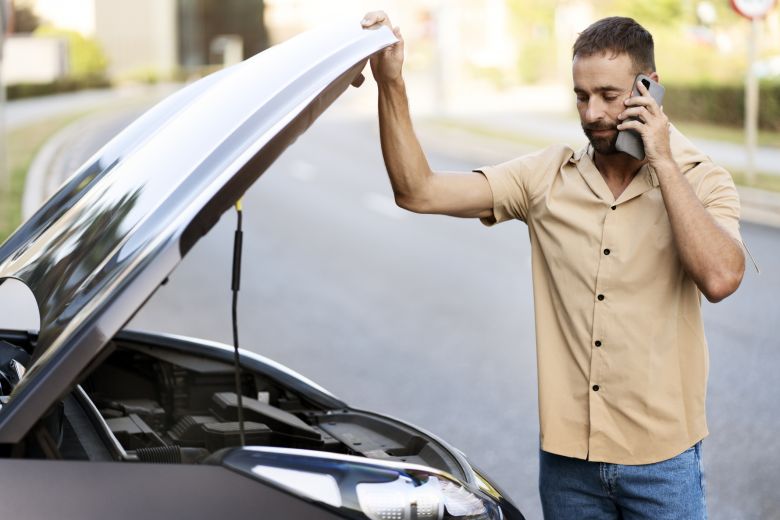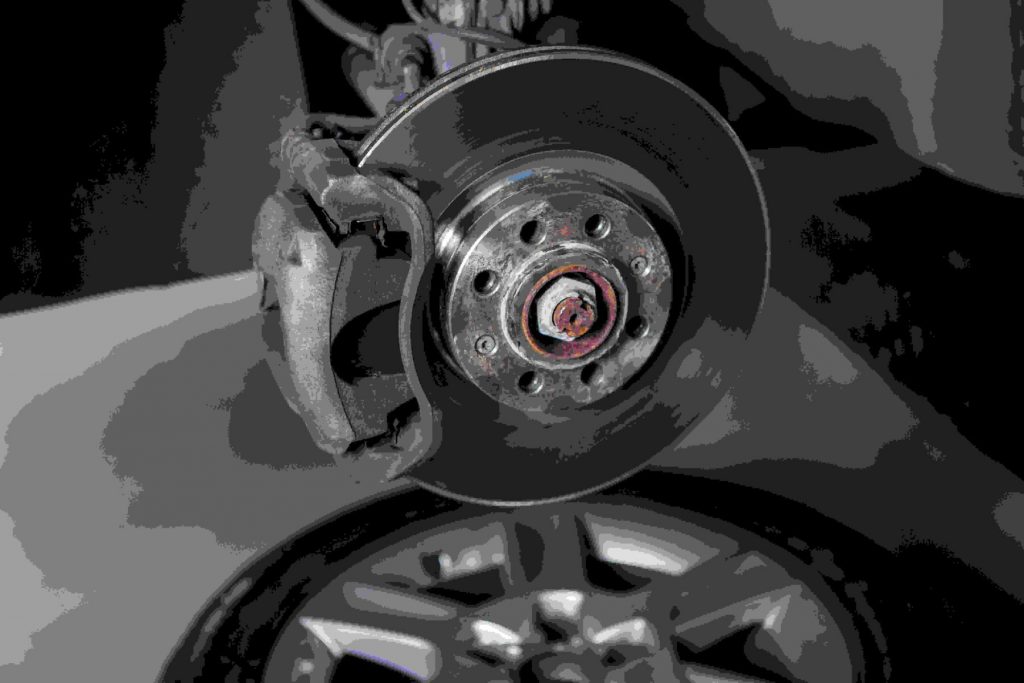Picture this: it’s a sweltering afternoon in Sharjah and you’re parked outside a shop, engine running to keep the A/C blasting cold air. Or perhaps you’re waiting to pick someone up and consider leaving the car idling rather than turning it off. Many drivers have wondered: how long can you safely keep your car running while parked, and what are the consequences? As an auto maintenance team in Sharjah, we at Burj Malabar Auto Maintenance hear this question often. In this article, we’ll explore how long a car can idle, why excessive idling is problematic, and what every driver should know about fuel, engine wear, and safety when leaving a car running.
How Long Can Your Car Run While Parked?
Idling refers to running your engine while the vehicle is stationary. Technically, a well-maintained car can idle for hours on end – even indefinitely – as long as it has fuel and nothing critical fails. In practice, the limit to how long you can keep the engine running is constrained by fuel and heat. A car consumes fuel continuously when idling (though at a lower rate than driving). For example, a compact car may burn roughly 0.6 liters of petrol per hour just idling, whereas a large SUV or V8 engine might consume about 1.5 liters per hour. With a full tank (say 50–70 liters), that translates to dozens of hours of runtime if nothing else goes wrong. In theory, you could leave the engine on until you run out of gas or until a component gives out – whichever comes first.
However, just because you can let your car idle that long doesn’t mean you should. Heat buildup is a major limiting factor. Modern cars are designed to handle stop-and-go traffic, but extended idling can push the cooling system to its limits. Without forward motion, there’s no ram air flow through the radiator – your car relies entirely on the radiator fan and coolant circulation to dissipate heat. Over time, this can strain parts like the fan motor, water pump, and thermostat, especially in Sharjah’s extreme climate. If any part of the cooling system is weak, very long idling could lead to overheating. There’s even an extreme case reported of a driver who left a truck idling overnight, only to find the engine overheated and destroyed itself by morning – a sobering reminder that running the engine for hours unattended can end in disaster. While that’s an uncommon scenario, it highlights that a car isn’t truly meant to idle forever. Something as simple as a broken fan belt could quickly lead to overheating if the engine is left running long enough.
Another consideration is your battery and electrical system. When the engine idles, the alternator is spinning slowly. It will generally produce enough current to run basic accessories and charge the battery – but if you have a lot of electrical load (headlights, a powerful stereo, A/C blower on max, etc.), the alternator might not keep up at idle RPMs. In such cases, the battery can slowly discharge even while the engine runs, potentially leaving you with a dead battery after extended idling. This is more likely if you idle for a long time with many accessories on, or if your alternator or battery is weak to begin with.
In short, physically your car’s engine can run for many hours while parked given enough fuel, but extended idling carries risks of its own. The following table illustrates some typical idling durations, fuel usage, and impacts for an average petrol car:
| Idling Duration | Approx. Fuel Used (Petrol)* | Potential Impacts & Considerations |
|---|---|---|
| 5 minutes | ~0.05–0.12 L | Minimal impact on vehicle. Engine barely warms up; very small fuel waste and emissions (but avoid making it a frequent habit). |
| 30 minutes | ~0.3–0.8 L | Wastes fuel equivalent to ~5–10 km of driving. Engine reaches normal operating temperature. Repeated long idles can cause slight carbon build-up in the engine and use fuel needlessly. |
| 1 hour | ~0.6–1.5 L | Significant fuel burned (could drive ~10–20 km on that fuel). Engine oil pressure stays low, meaning critical parts get less lubrication than during driving. More heat in engine bay; cooling fan cycles frequently. If accessories (A/C, lights) are on, battery may strain to keep up. |
| 8 hours (overnight) | ~5–12 L | Very high fuel waste – on the order of a quarter tank or more. Extended heat soak in engine components; risk of overheating if any cooling part fails or in very hot weather. Idling this long is not recommended – it can lead to serious engine stress or even failure. Never leave a car idling unattended this long (risk of theft, and it’s illegal in Sharjah). |
*Fuel usage ranges are estimates for a small car vs. a large engine, based on ~0.6 L/hour for a compact sedan and ~1.5 L/hour for a big SUV at idle. Actual consumption will vary by vehicle.
As you can see, hours of idling can burn through a surprising amount of fuel and put needless wear on the engine. In the short term (a few minutes), idling isn’t likely to do damage by itself – modern engines can handle it. But as a general rule, if you’re waiting more than a minute or two, it’s better to turn off the engine and save fuel. According to the U.S. Department of Energy, idling for more than 10 seconds actually uses more fuel (and produces more emissions) than shutting off and restarting the engine. Modern fuel-injected engines re-start very efficiently, so you won’t harm the car by turning it off for brief stops. In fact, manufacturers advise against long idling – your car warms up faster by driving, and modern cars don’t need extended idle time to be ready to go.
Effects of Extended Idling on Your Car
What actually happens to your vehicle when it sits there idling for long periods? While occasional idle time (like waiting at a short light or drive-thru) won’t hurt, excessive idling can cause a variety of issues over time:
- Engine Carbon Build-up: When an engine runs at idle, it doesn’t operate at peak efficiency. Combustion is often incomplete, which means carbon deposits can gradually form on spark plugs, valves, and inside the combustion chambers. We’ve seen many Sharjah commuters who idle frequently end up with carbon-fouled components that lead to rough idling and reduced performance. In contrast, when you drive at normal speeds, the higher combustion pressures and temperatures tend to burn off deposits. Too much idling, especially if it’s a daily habit, can leave your engine dirtier on the inside and may eventually require a fuel system cleaning or tune-up to restore lost pep.
- Oil Dilution & Lubrication Issues: Idling for extended periods also affects your engine oil. With the engine at idle, the oil pump is spinning slowly and oil pressure is at its minimum. Critical engine parts might not receive optimal lubrication when idling for a long time. Moreover, idling (especially in cooler conditions) can lead to water vapor and unburned fuel sneaking past the piston rings, diluting the oil. This contamination can reduce the oil’s effectiveness in protecting the engine. Over months and years, excessive idle time contributes to oil sludge buildup and faster wear. Keep in mind that your odometer doesn’t record idle hours – an engine that has spent many hours idling may be more worn than its mileage suggests. (Some fleet vehicles and trucks track engine hours for this reason.)
- Overheating & Component Stress: Without motion, your cooling system and drivetrain don’t get the benefit of airflow. Heat can build up under the hood during long idles, which puts stress on the cooling system. The radiator fan has to cycle on frequently (or run constantly) to keep the engine cool. Water pumps and cooling fans are doing overtime duty. If any part of the system is marginal (e.g. an older thermostat or a partially clogged radiator), prolonged idling can push it over the edge. In our experience, we’ve encountered cases where vehicles that idle a lot develop issues like leaking coolant hoses or weak radiator fans that burn out sooner. Idling with the A/C on compounds the heat load – now the engine is driving the compressor and generating additional heat. Extended idling in Sharjah’s summer heat is thus a true torture test for your car’s cooling system. Most cars will handle it for a while, but the longer you go, the more you risk the temperature creeping up. If you ever notice the temperature gauge rising or smell something hot while idling, don’t ignore it – it’s a sign to shut off the engine.
- Spark Plugs & Exhaust System: Lots of low-RPM run time can also contribute to spark plug fouling (from carbon and soot) and can leave residue in the exhaust system and catalytic converter. The catalytic converter can only do its job when it’s hot; idling for too long (especially if the car isn’t fully warmed) means extra pollutants may slip through. Drivability issues like engine misfires, rough idle, and reduced fuel efficiency are common in cars that spend too much time idling. Simply put, engines are designed to run, not sit running endlessly.
The bottom line is that idling puts wear on your engine and components without giving you the benefit of distance traveled. It’s like running a marathon in place – you burn energy (fuel) and stress the machinery, but don’t actually get anywhere. Over time, that can shorten the lifespan of parts. At Burj Malabar, we make it a point to ask customers about their driving habits; a car that’s mostly doing highway miles will have a different wear pattern than one that spends hours idling in delivery queues or school pickup lines. If you do have to idle frequently (for example, professional drivers waiting on fares), be sure to service your car regularly. Frequent oil changes, cooling system checks, and using quality fuel can help mitigate the effects of heavy idling. And if you notice new noises, rough running, or high engine temperatures, get the car inspected before a small issue (like a weak cooling fan) turns into a major failure.
Fuel, Emissions and Safety Considerations
Beyond the direct wear on the car, leaving your vehicle running while parked has broader implications for fuel consumption, the environment, and safety. Fuel prices in the UAE may be relatively low compared to Europe, but wasting fuel is never a good idea – and idling is literally zero km per liter. Every minute your engine idles, you’re getting 0 MPG while still burning fuel. Over time this can add up to a noticeable hit on your wallet. For instance, idling a medium-sized car can easily burn half a liter of petrol or more per hour. Ten minutes here, twenty minutes there – if it becomes a habit, you might be wasting dozens of liters of fuel over a month just sitting still. That’s money paid for no movement at all.
The environmental cost is significant as well. Vehicle exhaust from idling contributes to air pollution and carbon dioxide emissions. In fact, a continuously idling engine can produce as much or even double the amount of certain emissions compared to a car that’s moving at moderate speed. Catalytic converters and emission control systems work best when the car is being driven and the exhaust is hot; during long idle, those systems aren’t as efficient. The result is more unburnt hydrocarbons and carbon monoxide spewing into the air around you. This is why many countries and cities have enacted anti-idling laws (often limiting idling to 2–5 minutes) to cut down on needless pollution. While Sharjah doesn’t currently ticket drivers specifically for emission-related idling, it’s good civic sense to avoid polluting the air we all breathe. Simply turning off your engine when parked is one of the easiest ways to reduce your carbon footprint as a driver.
Now let’s talk about safety and legal considerations, because there are important ones especially in our region. First and foremost: Never leave your car idling unattended. If you hop out of the vehicle while it’s still running – even “just for a minute” – you’re inviting trouble. Your car could roll away (if a gear slips or the parking brake isn’t set properly), or a curious child could climb from the back seat and knock the car into gear. Most commonly, an unattended running car is an easy target for car thieves. In fact, Sharjah authorities have cracked down on this; leaving a vehicle running unattended is considered a traffic violation. Drivers can be fined around AED 300 for this offense. The rule is there to prevent thefts and accidents – and indeed, police reports have shown that opportunistic thieves look for cars left idling outside shops or homes. We strongly advise: if you need to run into a store or anywhere else, turn off and lock your car every time.
Another safety aspect is carbon monoxide (CO) exposure. CO is a colorless, odorless poison present in exhaust fumes. Normally, if you’re outdoors with the car idling, CO dissipates and is not a direct threat to the occupants. But in enclosed or poorly ventilated areas, idling a car is dangerous. Running your engine inside a closed garage, for example, can quickly lead to lethal CO buildup – even with the garage door open partway, the fumes can concentrate. There have been tragic cases of people napping in an idling car or warming up a vehicle in a sealed garage and succumbing to carbon monoxide poisoning. Even in open air, be cautious if you idle with the A/C on while parked for a long time. There is a small risk that CO can enter the cabin (especially if your exhaust isn’t in perfect shape or if the wind pushes fumes toward your car). One source notes that if a car is left idling with A/C on for too long, you do risk CO poisoning for the occupants. Always ensure your exhaust system has no leaks and avoid idling in one spot for extended periods with people inside, just to be safe. If you ever feel dizzy or nauseous when sitting in an idling car, get fresh air immediately.
Lastly, consider when and where you’re idling. Idling in neutral at a traffic jam is unavoidable – that’s fine. But idling in a public place unnecessarily can also be a noise and smell nuisance to others. The UAE’s climate often tempts us to keep the A/C running; still, if you’re waiting for someone for 10–15 minutes, it might be wiser (and more polite) to park in the shade, turn off the car, and maybe step out or wait in a cooler spot if possible, rather than idling. And remember, if you’re ever in a situation where you need to idle for a very long time (say, waiting in the car for an hour due to some emergency), keep an eye on your temperature gauge and fuel. Idling isn’t likely to suddenly catastrophically fail your car, but vigilance is key. If the engine begins to overheat or if you’re low on fuel, you’ll want to shut it off. It’s also a good practice to occasionally rev the engine slightly or drive a short distance if you’ve been idling a really long time, just to get fluids circulating (though this scenario is rare for most private car owners).
Idle Less, Drive Smart
At the end of the day, the question isn’t just “How long can you keep it running?” but rather “How long should you?” The answer: only as long as absolutely necessary, and preferably no more than a few minutes at a stretch. Your car can idle for very long periods, but doing so serves little purpose and comes with significant downsides – from wasting fuel and money to putting extra wear on your engine, to pumping out unnecessary pollution. Modern vehicles don’t need lengthy warm-ups or idle time; in fact, they’re happier being driven than sitting still. As Sharjah drivers, we have the benefit of a warm climate (no frigid warm-up needed) and plentiful petrol stations, so there’s rarely a reason to leave the engine running while parked for more than a brief moment.
Our advice is simple: avoid extended idling whenever you can. If you’re parked and waiting, use your judgment – if it looks like more than a minute or two, it’s usually better to switch off the engine. You’ll save fuel, reduce wear, and keep the air a bit cleaner. If you must idle (for instance, to stay cool in the A/C during a short wait), try to limit it to the minimum time necessary. And never leave the car idling unattended or in an enclosed space – no errand is worth risking a theft or safety hazard.
By being mindful of idle time, you’re not only protecting your car but also being a responsible driver. We at Burj Malabar Auto Maintenance are dedicated to keeping your vehicle running efficiently and safely. Preventive care isn’t just about oil changes and brake pads – it also means adopting smart habits like avoiding unnecessary idling. By idling less and driving smart, you’ll save fuel and extend the life of your engine. And if you ever have concerns – be it a tired battery from too much A/C idling, an overheating issue, or any wear-and-tear problem – we’re here to help. Our Sharjah-based technicians can check your cooling system, battery, and overall engine health to ensure your car is in top shape for the roads ahead. Remember: treat your car kindly, and it will reward you with reliable performance for many years to come.



